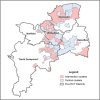Cluster randomised controlled trial of a financial incentive for mothers to improve breast feeding in areas with low breastfeeding rates: the NOSH study protocol
- PMID: 27067889
- PMCID: PMC4838737
- DOI: 10.1136/bmjopen-2015-010158
Cluster randomised controlled trial of a financial incentive for mothers to improve breast feeding in areas with low breastfeeding rates: the NOSH study protocol
Erratum in
-
Correction: Cluster randomised controlled trial of a financial incentive for mothers to improve breast feeding in areas with low breastfeeding rates: the NOSH study protocol.BMJ Open. 2016 Jul 19;6(7):e010158corr1. doi: 10.1136/bmjopen-2015-010158corr1. BMJ Open. 2016. PMID: 27436664 Free PMC article. No abstract available.
Abstract
Introduction: Breast feeding can promote positive long-term and short-term health outcomes in infant and mother. The UK has one of the lowest breastfeeding rates (duration and exclusivity) in the world, resulting in preventable morbidities and associated healthcare costs. Breastfeeding rates are also socially patterned, thereby potentially contributing to health inequalities. Financial incentives have been shown to have a positive effect on health behaviours in previously published studies.
Methods and analysis: Based on data from earlier development and feasibility stages, a cluster (electoral ward) randomised trial with mixed-method process and content evaluation was designed. The 'Nourishing Start for Health' (NOSH) intervention comprises a financial incentive programme of up to 6 months duration, delivered by front-line healthcare professionals, in addition to existing breastfeeding support. The intervention aims to increase the prevalence and duration of breast feeding in wards with low breastfeeding rates. The comparator is usual care (no offer of NOSH intervention). Routine data on breastfeeding rates at 6-8 weeks will be collected for 92 clusters (electoral wards) on an estimated 10,833 births. This sample is calculated to provide 80% power in determining a 4% point difference in breastfeeding rates between groups. Content and process evaluation will include interviews with mothers, healthcare providers, funders and commissioners of infant feeding services. The economic analyses, using a healthcare provider's perspective, will be twofold, including a within-trial cost-effectiveness analysis and beyond-trial modelling of longer term expectations for cost-effectiveness. Results of economic analyses will be expressed as cost per percentage point change in cluster level in breastfeeding rates between trial arms. In addition, we will present difference in resource use impacts for a range of acute conditions in babies aged 0-6 months.
Ethics and dissemination: Participating organisations Research and Governance departments approved the study. Results will be published in peer-reviewed journals and at conference presentations.
Trial registration number: ISRCTN44898617; Pre-results.
Keywords: Breastfeeding; cluster RCT; financial incentives; protocol.
Published by the BMJ Publishing Group Limited. For permission to use (where not already granted under a licence) please go to http://www.bmj.com/company/products-services/rights-and-licensing/
Figures



References
-
- WHO. Global strategy for infant and young child feeding. Geneva, Switzerland: World Health Organization, 2003.
-
- Department of Health SSaPS. Breastfeeding and introducing solid foods: consumer insight summary. London, UK: Department of Health, 2010:31.
-
- Horta BL, Bahl R, Martines JC et al. . Evidence on the long-term effects of breastfeeding: systematic review and meta-analyses. Geneva, Switzerland: Wrold Health Organisation, 2007.
-
- McAndrew F, Thompson J, Fellows L et al. . Infant feeding survey 2010: summary. Health and Social Care Information Centre, 2012.
Publication types
MeSH terms
Associated data
Grants and funding
LinkOut - more resources
Full Text Sources
Other Literature Sources
Medical
